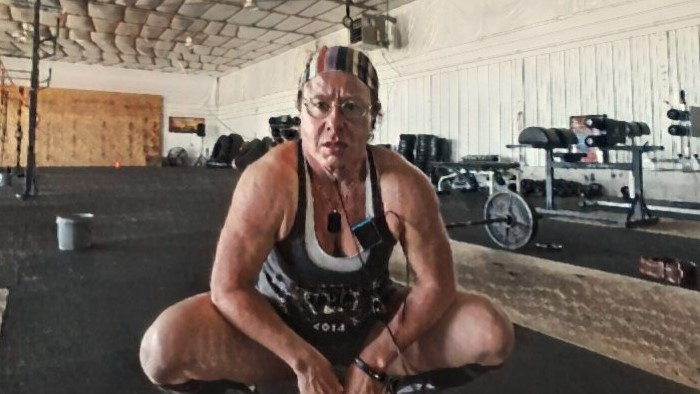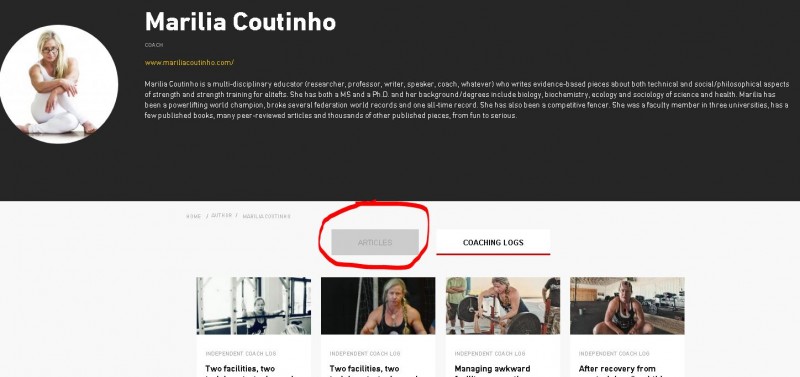
Strength coaching is probably my fourth or fifth professional hat. Before that, I was an academic researcher for decades and in this capacity, I migrated from very basic fields (biochemistry/organic chemistry/molecular biology) and a background in evolutionary biology to more applied ones (molecular parasitology, chemical ecology) to the philosophy and finally social and policy spectrum of “science making” (technology transfer, biopiracy, cancer research policy, etc).
It was years after I had resigned from my academic positions that I migrated (or rather added) to exercise science, started publishing about strength training and was finally asked to teach about strength training. After I had my license with the National Physical Education Council in Brazil to be professionally involved in strength training, I was hired as a coach.
It’s perfectly normal, then, that I’m still seen as mostly a consultant and researcher. Maybe that’s true and I’m a coach just as long as I am a source of advice.
I do get inquiries that are far from the regular strength coach routine and they are incredibly varied. Mostly, they are inquiries about complex technical issues that involve trust. One of them is muscle wasting in cancer.
I’m 56 yrs old and I have friends and family going all the way up to over 90 yrs old. That counts, too: it’s easier for a person to share a concern and ask questions pertaining to a condition highly associated with aging to an old person rather than to a young coach, researcher or even a physician. My 93 yr old mother, for example, is weary of young professionals. According to her, they are frequently “too eager” and that raises all her red flags.
I believe I’ve been asked about muscle wasting and quality of life in cancer by over half a dozen patients who are still alive. Most of them are prostate cancer patients, possibly because I published about this specific cancer.
The first thing I tell them is that I am a researcher and “not that kind of doctor” (I’m a Ph.D., not an MD) and my comments should be used as material to discuss with their physician. The part where I am self-sufficient to offer advice is only strength training.
On this respect, a disciplined, frequent, intense strength training program is their best choice to maintain muscle mass or minimize loss once they reach androgen deprivation therapy.
Some readings:
Exercise-oncology research: Past, present, and future
High-intensity strength training improves quality of life in cancer survivors
They all have questions about pharmacological approaches to their condition. Here’s where everything I offer is a contribution to the doctor-patient conversation. There is class of drugs being developed, researched and currently under clinical trial or even beyond it called “Selective androgen receptor modulators” (SARMs). Since advanced-treatment cancer patients are being actively deprived of testosterone and DHT due to their cancer-stimulant effect over prostate cancer cells, usually testosterone is out of the question. Some studies suggest that SARMS may be beneficial to most cancer and cachexia patients but particularly useful to prostate cancer ones. They have shown to improve muscle mass, some of them even have CNS protective activity among other effects. They also have side-effects, as almost everything.
Here are some recent studies:
Wasting away: How to treat cachexia and muscle wasting in chronic disease?
Unlike intense strength training, which I do recommend, I do not recommend the use of any SARM. I do, however, encourage that the person consulting me takes my input to talk to their physician. Unfortunately, most physicians won’t consider reading the studies and if they do, their fear and caution will lead them to dismiss the option. Most physicians in the USA are afraid of disciplinary action from medical boards, insurance companies or other organisms that restrain their freedom of choice when it comes to patient treatment. They are also very scared of legal action from the patient in case anything goes wrong, even if it’s not their fault.
This is really sad and as someone who works with physicians outside the USA, I am sorry for this scenario. There is nothing I can do beyond offering information from the medical literature and other colleagues’ experiences.
Most of the advice I’ve offered recently as a “scientist-coach” has been sad. It’s my job, though. I will share other types of inquiry I get because I think it is important that readers know what kind of reality is the one people like me work in.
For evidence-based articles on strength training, click on the "article" link on my author's page:










